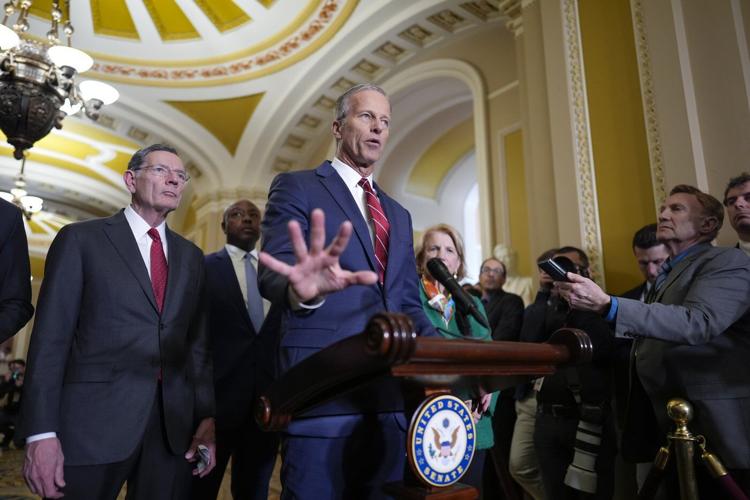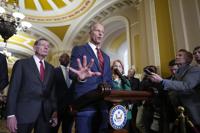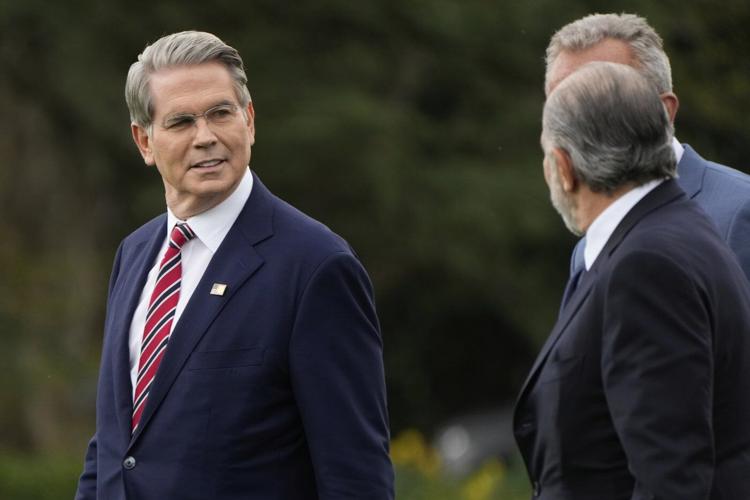WASHINGTON (AP) — Republican senators unveiled a budget proposal Wednesday that's central to President Donald Trump's domestic agenda of tax breaks, spending cuts and border security, but they're delaying some of the most difficult decisions, including how to pay for the multitrillion-dollar package.
Trump hosted Senate Republicans at the White House as they charge ahead to pass the framework by week's end. Facing a wall of Democratic opposition, Trump publicly and privately assured the GOP senators he would back the plan — including its massive cuts to government programs and services. It also boosts the .
“The Senate plan has my complete and total support,” Trump said at a White House event later in the day announcing .
The president also lobbed a warning to the senators: “I won’t like them so much if they don’t get this bill done.”
The Senate GOP’s budget framework would be the companion to the that also calls for cutting as much as $2 trillion from and other programs. If the Senate can approve its blueprint, it would edge Trump's allies on Capitol Hill closer to a compromise setting the stage for a final product in the coming weeks.
Senate Majority Leader John Thune, R-S.D., said “it's now time for the Senate to move forward.”
While , Republicans face increasing political pressure to deliver on what is expected to be Trump’s signature domestic policy package: extending the tax cuts, which were , during his first term at the White House. Those tax breaks expire at the end of the year, and Trump wants to expand them to include new , as he promised during the 2024 campaign.
Democrats are preparing to oppose the GOP tax plans as giveaways to the wealthy, coming as billionaire Elon Musk's is taking a “chain saw” to the federal government. They warn Republicans plan to cut government programs and services that millions of Americans depend on nationwide.
“No amount of gaslighting from Republicans about the true cost of their tax plan,” said Sen. Ron Wyden of Oregon, the top Democrat on the Senate Finance Committee who pegged the price tag at “upward of $5 trillion.”
Wyden said they that Republicans want to pay for the package with massive cuts to health care and other programs. "In terms of American lives ruined and lost, the human toll of what Republicans are trying to accomplish will be horrific.”
The Senate bill proposes keeping nearly $4 trillion in existing tax cuts, and adding $1.5 trillion in new ones. It bolsters spending for defense, homeland security, the judiciary and the Coast Guard to more than $500 billion, though Graham has signaled it would likely end up closer to $345 billion.
As for the size of the spending cuts, it's still a work in progress. The Senate sets a much lower floor of $1 billion in reductions each for committees handling health care, food stamps and other programs. However, that can be raised, if needed, to compromise with the House’s estimated $2 trillion in cuts.
During the morning meeting at the White House, the GOP senators pressed Trump for backing as they vowed to push ahead with tax breaks that would surely be popular, but also spending cuts that could prove politically difficult.
“We asked him for his commitment, which I think was there anyway, to defend our efforts to reduce spending," said Sen. John Kennedy, R-La., "and to do that publicly and vociferously.”
“He is fully on board with the Senate’s proposal and process to cut spending,” said the Senate Budget Committee chair Sen. Lindsey Graham, R-S.C.
One main sticking point between the House and Senate GOP plans has been over whether the existing tax cuts, which are estimated to cost the federal government as much $4.5 trillion over the decade, need to be paid for by spending reductions elsewhere. Adding Trump's new tax breaks to the package would balloon the price tag.
To offset the costs, House Republicans are demanding big cuts to programs and services to prevent the nation's $36 trillion debt load from skyrocketing.
But GOP senators have a different approach. They take the view that because the tax cuts are already the current policy, they would not be new and add to future deficits. The legislation says the Budget chair has the authority to use “realistic assumptions” on the current policy baseline moving forward, meaning only Trump's other proposed tax breaks would come with a new cost.
Senate Minority Leader Chuck Schumer of New York and top Democrats call the Senate GOP's approach a gimmick at best, if not an outright “lie.”
“It is an obscene fraud and the American people won’t stand for it,” said Schumer, Wyden and Sen. Jeff Merkley of the Budget Committee in a letter to GOP leadership.
Typically, the current policy baseline proposal would need to pass the muster of to make sure it abides by the strict rules of the budget process. Senators from both parties have been arguing in closed-door sessions with the parliamentarian staff — for and against the idea. But Republicans are pressing ahead, for now, regardless of the outcome.
Democratic said of the emerging GOP plan during a landmark overnight speech, “What they’re investing in is bigger tax cuts for the wealthiest.”
has urged Senate Republicans to get it done.
Treasury needs Congress to raise the nation's limit this summer to prevent a catastrophic federal default.
Trump has pushed Congress to resolve the debt ceiling issue now so Democrats cannot use it as a leverage point making demands on their own priorities. The House provided a $4 trillion increase in its proposal, but senators upped it to $5 trillion to avoid having to face the issue again before the 2026 midterm elections.
Senators want to move quickly this week to pass the framework which will entail a lengthy all-night vote that could drag into the weekend. Then, they will sort out the details later as the House and Senate Republicans, facing Democratic opposition, build the actual package for consideration in the weeks, if not months, ahead.
__
Associated Press writer Seung Min Kim contributed to this report.









































